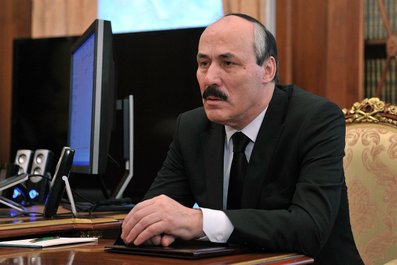
Ramazan Abdulatipov Confirmed as Dagestan’s President
Publication: Eurasia Daily Monitor Volume: 10 Issue: 161
By:

While opposition candidates are allowed to run for office in Russian cities like Moscow and Yekaterinburg—and, in the case of the mayoral race in the latter, possibly even win—the situation in the North Caucasus remains quite different. Indeed, opposition candidates are completely excluded from running for the office of the governor of a North Caucasian republic (https://moidagestan.ru/blogs/41037/32176). The mechanism of exclusion primarily rests on the indirect vote. When the current leader of Dagestan, Ramazan Abdulatipov, was announced as the candidate for leadership in Dagestan at the beginning of 2013, he thought the republic was ready for direct elections for governor (https://kavpolit.com/dagestan-edinstvennyj-gotov-k-pryamym-vyboram-prezidenta/l). Abdulatipov’s opinion quickly changed after he became the acting governor of Dagestan. After he was appointed, Moscow soon decided not to take any risks and to leave the old system of appointing governors in Dagestan intact, even though the rest of Russia will elect their governors through a popular vote.
According to the rules, parties and movements are supposed to present their nominations to the Russian presidential administration, which then selects three candidates based upon the principles known only to the Kremlin and then offers them to the regional parliament (https://ria.ru/politics/20130819/957185269.html). The leadership of the Dagestani parliament literally indulged in twisting the arms of the deputies to force them to pass the Kremlin’s proposal for the procedure for appointing governors on April 18. The proposal failed to pass the Dagestani parliament three times in secret voting. Only after the speaker of the parliament, Khizri Shikhsaidov, decreed that the deputies should cast their ballots openly by raising their IDs did the deputies decide not to contradict the Kremlin: they voted to support the proposal that the head of Dagestan be appointed by the Russian president and confirmed by the republican parliament (https://www.gazeta.ru/politics/2013/04/18_a_5260641.shtml). Seventy-four deputies voted in favor of the proposal, nine voted against and three abstained (https://nsrd.ru/pub/sessii/prezidenta_vibiraet_parlament_dagestanskaya_p_19_04_2013).
Interestingly, even though the presidential party United Russia holds 60 of the Dagestani parliament’s 90 seats, it failed to pass the Kremlin-sponsored legislation during the secret voting. When the vote became open, however, few dared to show their opposition: even deputies from the parties formally opposed to the government voted for the Kremlin’s project.
There were no surprises in President Vladimir Putin’s nominations for the position of president of Dagestan—Ramazan Abdulatipov; the chairman of the Accounting Chamber of the Dagestani parliament, Malik Bagliev; and Dagestani human rights ombudsman Ummupazil Omarova (https://ria.ru/politics/20130819/957185269.html). Bagliev and Omarova were almost certainly put on the ballot just to give the impression of having contested elections and thereby to legitimize the Kremlin’s appointee, Abdulatipov.
The question is why Moscow retracted its initial proposal to hold direct elections for governors in the North Caucasus and specifically in Dagestan (https://www.ng.ru/politics/2013-04-22/1_vybory.html). Most likely, Moscow wanted to avoid inter-ethnic clashes in Dagestan that could accompany the election campaign. The resignation of the previous president of Dagestan, Magomedsalam Magomedov, an ethnic Dargin, and rise to power of Abdulatipov, an ethnic Avar, may have intensified the conflict between the Avars and the Dargins. Smaller ethnic groups would have supported the Dargins to oppose the Avars, who are the largest ethnic group in the republic. This was the main reason for the quick removal of the prominent Dargin politician, Said Amirov, as Makhachkala the mayor in July. The public’s hopes that Dagestan’s clan system would be dismantled, however, were not realized (https://expert.ru/expert/2013/23/kto-zdes-vlast/). While some Dargins were fired from their positions, other Dargins took over, so Abdulatipov’s promise to “break the system” has not yet materialized.
Abdulatipov was formally “elected” as Dagestan’s president by its parliament on September 8. Now he will have to prove to Moscow that even if he is not another Ramzan Kadyrov, he is at least very similar to the Chechen leader. Certain actions by Abdulatipov so strikingly resemble those of Kadyrov that it has become obvious both republics are supervised by the same person in the Kremlin (https://www.obzor-smi.ru/?com=articles&page=article&id=9997). The image of the new Dagestani leader was crafted the same way as that of the Chechen leader. For example, a week before the elections, relics of the Prophet Muhammad were brought to Dagestan (https://www.rg.ru/2013/08/26/reg-skfo/relikvia-anons.html). Earlier in the run-up to the elections, government forces killed a leader of the jamaat in Buinaksk, Bammatkhan Sheikhov (https://kavkaz-antiterror.ru/?p=news&id=436). This was presented as an achievement of Abdulatipov. Moreover, at a meeting with the Dagestani police force on September 6, two days before the elections, Abdulatipov announced that a purge of the republican police was necessary, as some of the police officers were “flirting with the militants” (https://u-f.ru/News/u20/2013/09/06/660994). At a meeting with the Federal Security Service (FSB) branch in Dagestan, Abdulatipov expressed concern about Dagestani ex-officials who had fled to the city of Yalova in Turkey and allegedly protected the family of the militant leader Ibragim Gajidadaev, who was reportedly killed in March (https://regnum.ru/news/polit/1703825.html). The day before the elections, the police carried out a security sweep on several streets in Makhachkala that were under suspicion (https://pravozashita05.ru/dorushev/).
The new Dagestani president is bound to hear about the armed resistance in the republic for a long time to come, since the resistance’s influence in the republic has grown stronger in recent years. Dagestan has become the base for the entire armed resistance movement of the North Caucasus. It is not surprising that even Russian converts to Islam who want to participate in the war against Russia move to Dagestan (https://ttolk.ru/?p=16963).
Thus, while Ramazan Abdulatipov has been officially confirmed as the new president of Dagestan, the old problems persist, such as the armed underground, the clan system, the division of the republic into spheres of influence by Dagestani millionaire, among others. Moscow is most concerned about the armed resistance movement, but Abdulatipov has no chance of improving the situation in this particular sphere in the next few years.




